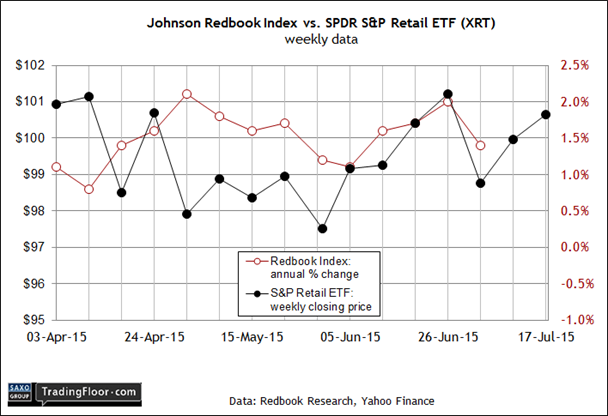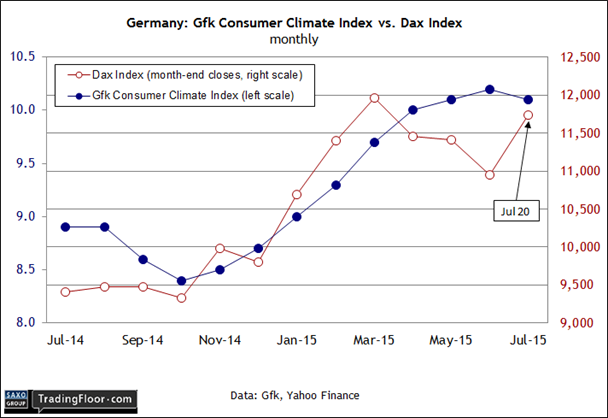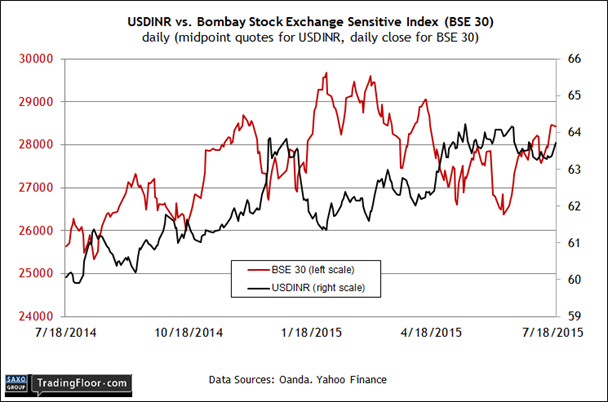Tuesday’s another slow day for economic releases, which means that retail spending numbers via the Redbook update will be widely read for an early clue on the US consumer sector at the start of the third quarter. Meanwhile, keep an eye on stock markets in Germany and India, where rallies in recent weeks may signal an upward trend for the rest of the summer.
US: Redbook Index (12:55 GMT) Next week’s “advance” estimate of second-quarter GDP is on track to confirm what’s already clear: the US economy has posted a moderate recovery after Q1’s stumble. The Atlanta Fed’s current Q2 GDP projection indicates a 2.4% annualised growth rate. That’s a bit sluggish, but no one will confuse it with the mild contraction in Q1. The question is whether growth will continue to accelerate in the second half of this year?
It’s too early to tell, although today’s weekly update of the Redbook Index, which measures spending at national chain stores, will offer an early clue on the start to the second half of the year.
Last week’s Redbook release reflected year-over-year growth of 1.4% for the first week of July, which matches the annual rise in the broader metric of retail sales through June. In both cases, the sight of growth is welcome after months of mixed numbers for the consumer sector. Nonetheless, a 1.4% rise is quite mild, suggesting that consumption remains a weak spot for the US economy.
But the “wisdom” of the crowd in terms of the stock market implies that stronger comparisons for spending are coming. The heavily traded SPDR S&P Retail (NYSE:XRT), which holds a basket of leading US retail shares, has been firming lately, posting a mild but conspicuous upward bias in recent weeks. Is that a signal that retail spending will perk up in the months ahead? If so, perhaps we’ll see some bullish support in today’s Redbook release.

Germany: DAX Index With the acute phase of the Greek crisis solved (or at least in remission), it’s no surprise to see a relief rally in the German stock market. Equities in Europe’s biggest economy bounced roughly 10% from the recent intraday low on July 8, based on the DAX Composite Index.
It’s unclear if this simply reflects an initial wave of optimism that a Grexit was avoided … or are we at the start of a new rally that carries the DAX above the previous high set in April?
The crowd’s still trying to sort out such questions. Although Germany's economy is on track for moderate growth in the near term, the current projections leave room for debate. The finance ministry in its latest monthly report advised that “gross domestic product likely increased in the second quarter at a similar rate as in the previous quarter when it rose by 0.3% on a seasonally and price-adjusted basis.”
Meanwhile, sentiment in Germany’s consumer sector ticked lower this month, based on the Gfk Consumer Climate study while the mood was mixed to slightly more optimistic among the country’s financial experts via ZEW's July survey figures.
Nonetheless, the DAX is holding on to its recent gains, closing yesterday (July 20) at its highest level since late May. There’s still a long way to go to reach the old peak of just below 12,375, which was set in April. But with the Eurozone recovery still intact at the moment, additional gains in the DAX wouldn’t be surprising without a material setback in the macro outlook.

India: BSE Sensex Index Expectations for India’s economy continue to look relatively upbeat vs. China, securing what some say is the title of the world’s most attractive emerging market at the moment.
“In light of the Chinese slowdown, India might appear to be a relatively safe emerging market for international funds,” opined the chief investment officer at LIC Nomura Mutual Fund.
Although the BSE Sensex 30 Index has suffered lately, the equity benchmark is up roughly 8% since the recent low in mid-June. The latest wave of upside momentum suggests that the former bull market that peaked in March may regain its footing. A critical factor for keeping the rally going is convincing foreign investors – a key force in pushing the BSE to a record high earlier this year –that India’s economic reforms will continue.
"Unless there is clarity on reform proposals investors are not keen to pump in new money," noted the managing director at KR Choksey Securities.
For now, the crowd is taking a respite in early trading this week after a buying spree that elevated BSE to its highest level since mid-April. But there may be another rally around the next bend. Prime Minister Narendra Modi yesterday outlined the case for expecting that the government will embrace labour reform laws. "Talks with labour organisations on labour reforms are on. I am confident that solutions to be found,” he said.
Assuming that a pro-reform agenda survives, political progress on this front may lay the foundation for a new bull market in India’s stock market.

Disclosure: Originally published at Saxo Bank TradingFloor.com
